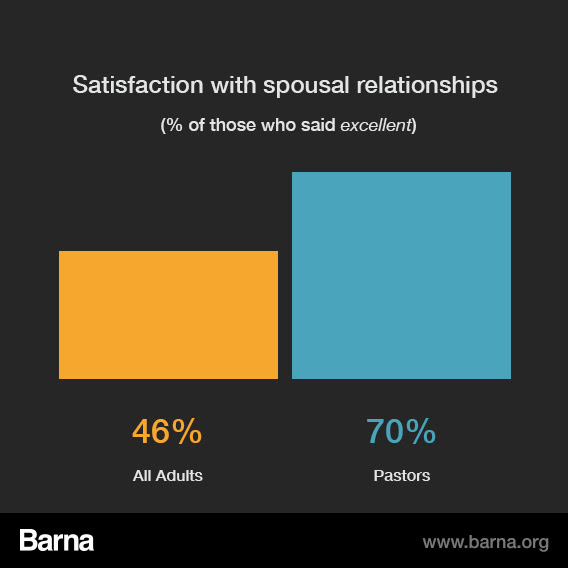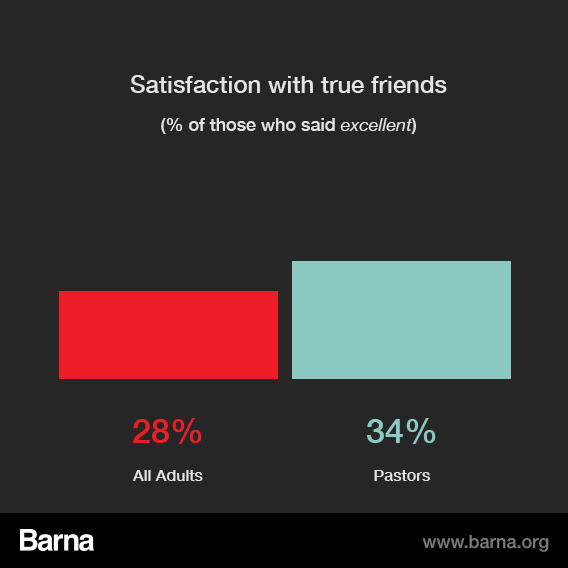Ministers yearning for higher salaries may be wealthier than they think, a new study suggests.
The tighter a pastor’s financial situation is, the fuller her or his relationships will be, according to the Barna Group. The organization says it finds a correlation between ministers’ finances and the health of their relationships — and less is definitely more.
“Financial constraints can be a relational burden; however, pastors with leaner resources tend to report a stronger connection with their spouse,” the Christian research group said in a study conducted with Pepperdine University.
 “Those who receive a lower salary are more likely than those who are financially better off to be satisfied in their marriage,” according to the report titled “How Healthy Are Pastors’ Relationships?”
“Those who receive a lower salary are more likely than those who are financially better off to be satisfied in their marriage,” according to the report titled “How Healthy Are Pastors’ Relationships?”
The report, which was released on Wednesday, offers another layer of perspective into the complexity of church life and ministry in the 21st century.
For years, studies have examined how ministers are at risk of burnout, depression and other challenges considered to be occupational hazards for clergy.
Low pay and poor, even non-existent benefits have been considered among the unavoidable drawbacks of the calling.
But it seems not to be as simple as all that.
The Barna-Pepperdine study examined “how today’s faith leaders are navigating life and leadership in an age of complexity.” The study looked at the health of ministers’ relationships with spouses and other family members, peers and friends.
Barna’s data confirmed that ministers who work hard at developing and maintaining intimate relationships are better able to withstand the pressures that come with ministry.
The research discovered a correlation between “relational metrics” — such as satisfactory friendships, spiritual support and pastor-elder relations — and job satisfaction and burnout avoidance.
Barna Vice President Brook Hempell said the data should compel ministers and churches to take actions to address those connections.
“Allowing time for nurturing these relationships and emotional support … to work through challenges is essential to a pastor’s overall well-being and that of their family,” Hempell said in remarks included in the report.
And many clergy seem to have figured a lot of this out already, according to the report.
“Most pastors — 96 percent of whom are married — are satisfied with their spousal relationship,” Barna reported.
Seven out of 10 say it is “excellent” and a quarter described it as “good,” researchers found.
Those statistics are revealing when compared to the wider population.
The report said less than half of Americans describe the state of their marriages as “excellent” and a third say it’s “good.”
Divorce rates also are lower: about 10 percent among Protestant pastors and 27 percent among all American adults.
“So, by and large, pastors report greater marital satisfaction than the general population,” Barna said.
 Children and friendships also are vital in supporting healthy pastors, Barna found.
Children and friendships also are vital in supporting healthy pastors, Barna found.
About one-third said they felt enthusiastic about relationships with their children 18 and under, and with their friendships.
“The correlations between higher friendship satisfaction and lower overall risk make a compelling case for the necessity of genuine friendships among pastors,” the report said.
But progress or and strength in these relationships cannot prevent challenges in family life.
“When asked whether it’s true that their current church tenure has been difficult on their family, two out of five pastors acknowledge it’s ‘somewhat true,’” according to the report. ”About half say it is either ‘not very’ or ‘not at all true.’
Only 8 percent said the statement is “completely true” in their settings.
Hempell said it is Barna’s aim to motivate denominations and lay leaders to invest in pastors’ relational support.
“This is the picture we are given of the body: when one part is hurting, the whole body suffers; when one part thrives, the whole body thrives,” she said.


